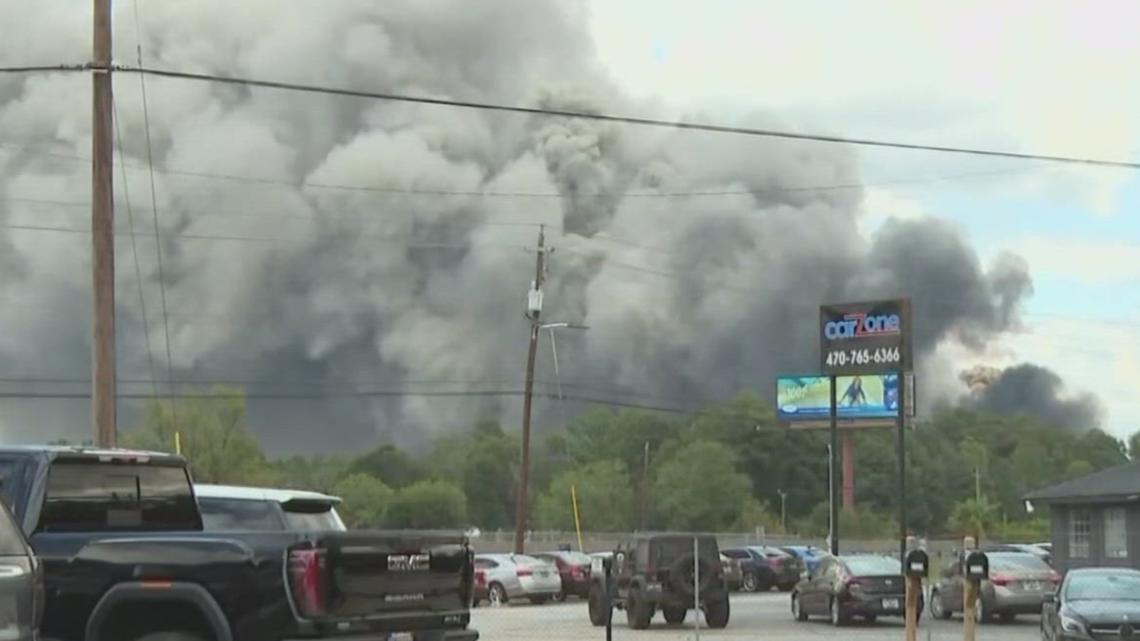
Conyers BioLab fire | Here's what an environmental expert says Georgia residents should do next
Posted on 10/01/2024

ATLANTA — The Environmental Protection Agency has detected chlorine in the air around BioLab but details such as the concentration or whether if any other chemicals have been released remains unknown Monday.
An EPA official provided an update Monday stating its continuing to run quality tests but has not yet found concerning level of chemicals. The company is required to submit a safety data sheet, so regulators have a better understanding of the potential impacts.
11Alive Senior Investigative Reporter Rebecca Lindstrom sat down with Dr. Andrew Whelton of Purdue University to talk about what concerns people may have and what they can do with them.
For months, Whelton assessed the damage after the train derailment in East Palestine, Ohio. Although they're vastly different incidents, the chemical and environmental expert said it's important for Georgians to remember they're allowed to ask questions about chemicals released into the atmosphere when situations, like these, arise.
"If you're in the evacuation area, you should be concerned and you should not be in that area. If you're outside the evacuation area and you smell chemicals, you have a right to be concerned," he said. "And you also have a right to then encourage emergency management officials to explain to you what exactly is happening and why you are allowed to be where you are."
Whelton added that if and when it's clear for residents to return home, they should be calling their home insurance companies to see if they will pay for an in-home testing of the carpet, walls and soil - emphasizing that the treat for our health isn't limited to when chemical fires are seen.
"Potentially, the impacts of this could be longer than a few days or weeks," he said. "It really depends upon the chemicals that are being discharged into the atmosphere or are allowed to run off, from the site to, you know, stormwater ditches and such."
Finally, the most important thing for residents in Georgia and any other city experiencing chemical fires or other environmental incidents is to remain vigilant.
"People exposed to pool and spa chemicals at high concentrations will experience upper respiratory problems, inhalation issues, ear, nose and throat issues. And, this can be, temporary or it can be long term," Whelton said. "And for those people outside the evacuation area, they need to petition the government agencies to tell them why it is okay for them to be where they are, especially if they smell it inside their homes."
An EPA official provided an update Monday stating its continuing to run quality tests but has not yet found concerning level of chemicals. The company is required to submit a safety data sheet, so regulators have a better understanding of the potential impacts.
11Alive Senior Investigative Reporter Rebecca Lindstrom sat down with Dr. Andrew Whelton of Purdue University to talk about what concerns people may have and what they can do with them.
For months, Whelton assessed the damage after the train derailment in East Palestine, Ohio. Although they're vastly different incidents, the chemical and environmental expert said it's important for Georgians to remember they're allowed to ask questions about chemicals released into the atmosphere when situations, like these, arise.
"If you're in the evacuation area, you should be concerned and you should not be in that area. If you're outside the evacuation area and you smell chemicals, you have a right to be concerned," he said. "And you also have a right to then encourage emergency management officials to explain to you what exactly is happening and why you are allowed to be where you are."
Whelton added that if and when it's clear for residents to return home, they should be calling their home insurance companies to see if they will pay for an in-home testing of the carpet, walls and soil - emphasizing that the treat for our health isn't limited to when chemical fires are seen.
"Potentially, the impacts of this could be longer than a few days or weeks," he said. "It really depends upon the chemicals that are being discharged into the atmosphere or are allowed to run off, from the site to, you know, stormwater ditches and such."
Finally, the most important thing for residents in Georgia and any other city experiencing chemical fires or other environmental incidents is to remain vigilant.
"People exposed to pool and spa chemicals at high concentrations will experience upper respiratory problems, inhalation issues, ear, nose and throat issues. And, this can be, temporary or it can be long term," Whelton said. "And for those people outside the evacuation area, they need to petition the government agencies to tell them why it is okay for them to be where they are, especially if they smell it inside their homes."
Comments( 0 )
0 0 0
0 0 3

:quality(70)/cloudfront-us-east-1.images.arcpublishing.com/adn/JF6FH7DLYVBLZMKLMUUM52A2CI.JPG)




















